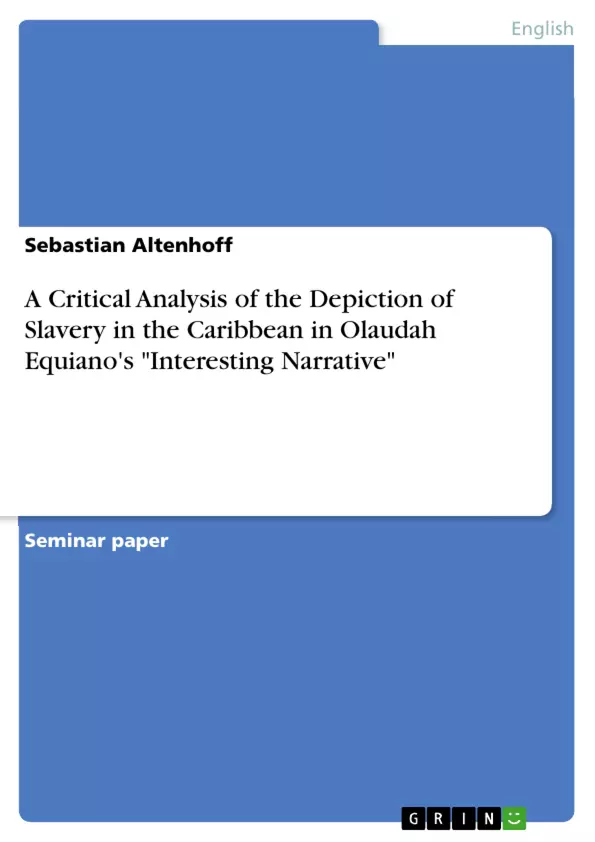The Interesting Narrative of the Life of Olaudah Equiano or Gustavus Vassa, the African. Written by Himself is the astonishing and moving autobiography of an 18th century slave. The author, the aforementioned Olaudah Equiano , tells the story of his life, recounting events such as his capture in Africa at early childhood, the notorious Middle Passage, his time in the service of the Quaker Robert King, his life as a freedman in the Caribbean, and finally his involvement in the abolitionist cause.
This term paper will be concerned with the author’s observations of the conditions of slavery in the West Indies, made first as a slave to Mr King, later as a free businessman. His account will be checked against external evidence drawn from a number of scholarly sources. The comparison includes the development of the slave trade in Africa and the rise of the Caribbean slave societies in the light of the ‘sugar revolution’, although the working conditions of slaves, together with the treatment of freedmen, will be at the centre of attention. While my original interest lay in researching the accuracy of Equiano’s version, my fascination gradually shifted from the ‘if’ to the ‘why’ and brought the question of identity into play. What with the restricted dimensions of this essay, the critical evaluation in the final chapter cannot provide the full range of answers, but offer a profound basis for a more specialist examination of the topic of identity in slave narratives.
Table of Contents
- Introduction
- African Slavery in the Caribbean and the Interesting Narrative
- Society and Slavery
- Africa, Africans and the Slave Trade
- The Rise of the Caribbean Slave Societies
- Working Conditions and Treatment of Slaves
- Equiano's Manumission and Mercantile Activities
- Evaluation and Criticism
- Bibliography
Objectives and Key Themes
This term paper analyzes Olaudah Equiano's observations of slavery in the Caribbean, comparing them to scholarly perspectives. It examines the development of the slave trade in Africa and the rise of Caribbean slave societies, focusing on working conditions and the treatment of freedmen. The paper also explores the question of identity in slave narratives, particularly in relation to Equiano's own experiences.
- The conditions of slavery in the Caribbean, as depicted by Equiano
- The development of the slave trade in Africa
- The rise of Caribbean slave societies
- The treatment of freedmen in the Caribbean
- The question of identity in slave narratives
Chapter Summaries
- Introduction: The paper introduces Equiano's autobiography and outlines the focus on the author's observations of slavery in the West Indies. It also highlights the comparison with external evidence and the exploration of identity in slave narratives.
- African Slavery in the Caribbean and the Interesting Narrative: This section provides a general overview of slavery, distinguishing between societies with slaves and slave societies. It then explores the history of slavery in Africa and the beginning of the transatlantic trade, setting the stage for the development of the West Indian slave societies.
- Society and Slavery: This chapter examines the phenomenon of slavery across societies, highlighting its historical prevalence and contrasting different types of societies where slavery existed. It also introduces the concept of slave societies and their economic significance.
- Africa, Africans and the Slave Trade: This chapter delves into the historical context of slavery in Africa, examining its prevalence both within Africa and in the transatlantic trade. It analyzes the roles of various actors, including the Portuguese, Muslim traders, and African tribes, in the development of the slave trade.
- The Rise of the Caribbean Slave Societies: This chapter is expected to explore the factors that led to the rise of Caribbean slave societies, particularly the 'sugar revolution' and the role of plantation agriculture in shaping the social and economic landscape of the region.
- Working Conditions and Treatment of Slaves: This chapter is expected to examine the conditions under which slaves lived and worked in the Caribbean, focusing on the challenges they faced, the forms of treatment they experienced, and the impact of slavery on their lives.
- Equiano's Manumission and Mercantile Activities: This chapter is expected to focus on Equiano's experiences as a freedman in the Caribbean, including his involvement in business and his efforts to navigate the social and economic realities of a society still heavily reliant on slave labor.
Keywords
The key themes and concepts addressed in this paper include slavery in the Caribbean, the transatlantic slave trade, the rise of Caribbean slave societies, the working conditions and treatment of slaves, the experience of freedmen, and the question of identity in slave narratives.
- Quote paper
- Sebastian Altenhoff (Author), 2009, A Critical Analysis of the Depiction of Slavery in the Caribbean in Olaudah Equiano's "Interesting Narrative", Munich, GRIN Verlag, https://www.grin.com/document/164257



